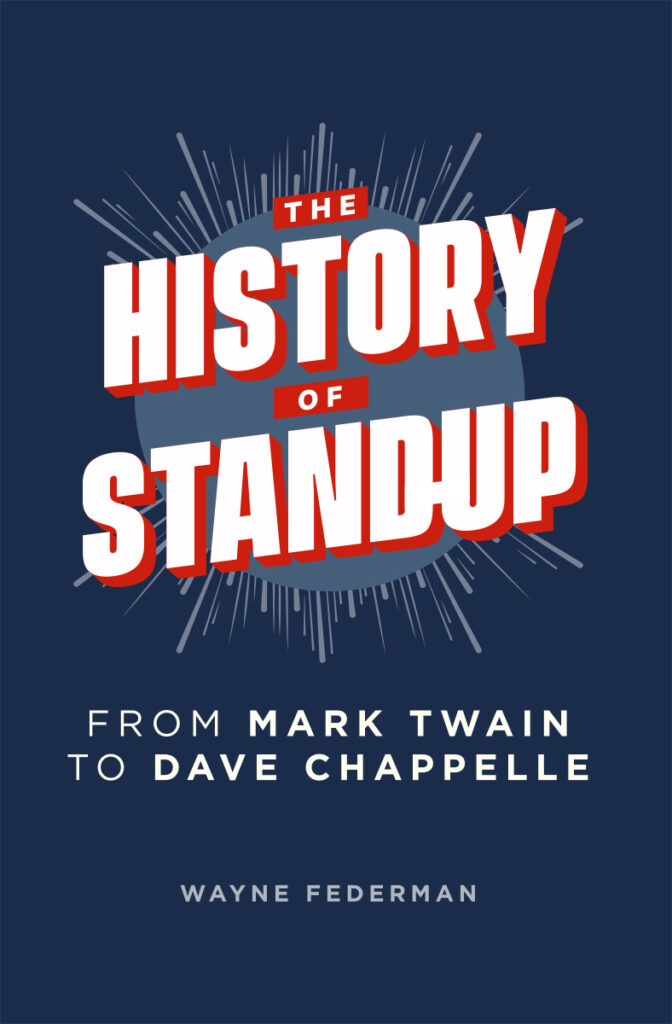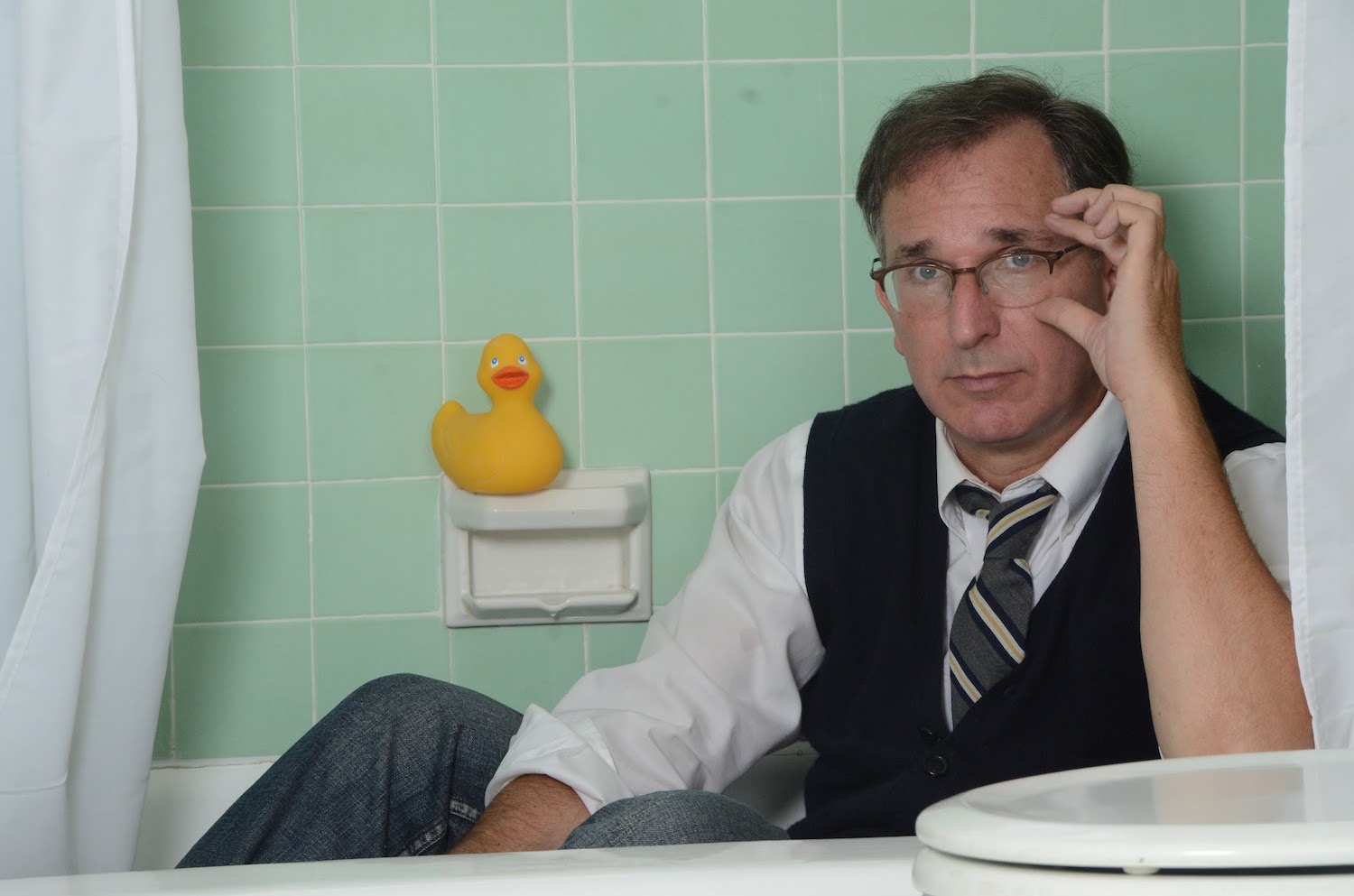A stage, a spotlight, a mic, and a lone comic trying to get laughs from a room full of tipsy patrons. It’s a familiar scene that comedy fans have missed in a year of sheltering in place.
While comedy clubs remain closed, many comedians have taken their routines to Zoom, including Wayne Federman, in an effort to create a happy medium.
But the acclaimed Curb Your Enthusiasm, Legally Blond, and Silicon Valley actor, Late Night with Jimmy Fallon writer, podcaster, professor, and historian also saw an opportunity in the downtime to sit and write the definitive chronicle of stand-up’s storied past.
Drawing on his immense knowledge of the subject (he cohosts The History of Standup podcast with Andrew Steven and lectures on the subject at USC), Federman traced the evolution of the art form, from its pioneering pre-vaudeville practitioners to contemporary comedians, in his new book, The History of Stand-Up: From Mark Twain to Dave Chappelle, out March 15.
Not surprisingly the absorbing and highly informative read mostly focuses on the dominant New York and LA comedy scenes, but it also includes a lot of interesting details about San Francisco’s stand-up stages dating back to the 19th century when comedy forefathers Artemus Ward and Bert Williams performed in The City.
Federman describes how in ensuing decades, the Smothers Brothers and Phylis Diller were discovered at the Purple Onion, Mort Sahl and Shelley Herman recorded breakthrough records at the hungry i, Lenny Bruce was arrested for “speech crimes” at the Jazz Workshop, Robin Williams’ early nights at the Holy City Zoo ignited the subsequent ‘80s comedy boom, and San Francisco became the birthplace of the Comedy Day festival and later, the home of Comedy Central’s Clusterfest.
It also shines a light on the many pioneering women (Fanny Brice, Elsie Janis), POC (Bert Williams, Jackie “Moms” Mabley), Jews (Groucho Marx, Jack Benny), and LGBTQ individuals (Bob Smith, Jaboukie Young-White) who shattered comedy’s glass ceiling.
I spoke to Federman, who is currently coproducing HBO’s upcoming George Carlin documentary with Judd Apatow, about The History of Stand-Up, San Francisco’s place in comedy history, and the future of stand-up in a post-COVID-19 world.
48 HILLS How did you become interested in the history of stand-up?
WAYNE FEDERMAN In high school, I discovered Edgar Bergen and Charlie McCarthy. Bergen was a ventriloquist on the radio, which sounds absurd. A few companies were starting to release old radio shows from the ‘30s and ‘40s on albums. That opened the door to many comedians from before my time like Fred Allen, Jack Benny, and Bob Hope. Also, two books, The Great Comedians Talk About Comedy and The Last Laugh were published around that time. I devoured them both and I was on my way. I haven’t stopped since.
48 HILLS Why release a book about the history of stand-up now?
WAYNE FEDERMAN Because there’s never been that book that’s traced the whole story from the pre-vaudeville era. Plus, we were in a huge comedy boom right before COVID.
48 HILLS The connective tissue in the book is “humans standing on stage, alone, trying to get laughs.” Why, in your opinion, do some people want to make a career of putting themselves in such a vulnerable spot? What made it attractive to you?
WAYNE FEDERMAN There’s a multitude of reasons. For me, I was a funny kid in school and teachers kept encouraging me to try it. So I gave it 10 years. And by then, I was doing pretty well, so I’ve just kept going.
48 HILLS You list several popular theories in your book, but where, in your opinion, does the term “stand-up” come from?
WAYNE FEDERMAN I believe it was shorthand by comedy bookers and agents trying to sell a certain kind of comedian who didn’t need a band or music cues or lighting effects. Just a microphone where they just stand and do jokes.
48 HILLS You describe San Francisco’s place in comedy history, mentioning some of the performers that played here and broke out here and, of course, its ’80s comedy boom. But what made The City’s stand-up scene unique?
WAYNE FEDERMAN I did a whole episode about San Francisco on my History of Standup podcast. First of all, it already had a great track record of supporting non-traditional comedians going back to the hungry i and Mort Sahl. Then the Purple Onion gave us the Smothers Brothers and Phyllis Diller.
But that doesn’t compare to what happened during the ‘80s boom when the whole city just embraced it. It was bonkers. They launched an official Comedy Day with a free outdoor show in the park. And there was [talk show host] Alex Bennett on the radio—and all those clubs. Plus, the comedy competition. And in the middle of it all was this tornado of talent named Robin Williams, who was a local kid.
48 HILLS From your book, it seems like the rules were different for women as far as where they performed and the types of comedy they could do. You mention that singing was an integral part of many early comediennes’ comedy acts. Why?
WAYNE FEDERMAN In the early 20th century, stand-up was primarily a men’s sport, but there was a slew of women who were hilarious: Mae West, Sophie Tucker, Fanny Brice, and Elsie Janis. But they all did songs. I guess that was just a way to get in the club until Jean Carroll and Moms Mabley came along.
48 HILLS What’s the legacy of these specific comics?
WAYNE FEDERMAN They were trailblazers and had to deal with a set of challenges that men didn’t have to think about. For example, Phyllis Diller purposely wore dresses that were unflattering so women and men would accept her.
48 HILLS You have a paragraph in the book about LGBTQ comics. What was their role in comedy history?
WAYNE FEDERMAN Well, like everything else, the world is more welcoming of diverse experiences. There wasn’t an openly gay comic on The Tonight Show till 1994. That’s 40 years after the show began.
48 HILLS From your book, it seems like even after minstrel shows and segregated venues became things of the past, there was still a division between black comedians doing black comedy for black audiences and white comedians doing white comedy for white audiences—into the 2000s. Where are we with that today?
WAYNE FEDERMAN That’s a good sociological question. It’s still going on. I noticed at comedy clubs, before the pandemic, there were black nights, Latinx nights, gay nights, Muslim nights, etc. I guess some people just want to see comedians that they can closely identify with.

48 HILLS You write extensively about the ways that stand-up comics quickly adapted to new technological forms—from trains to TV to TikTok. Why were comedians so eager to make use of these new advances? Did the ways they embraced these emerging forms differ from musicians, actors, etc.?
WAYNE FEDERMAN In some ways, it’s similar to singers. Certainly stage microphones changed singing styles dramatically. But, I think it’s a little different because comedians are very creative. Take podcasting. I don’t see musicians dominating the medium the way comics do.
48 HILLS You write that protests against comedic portrayals date back to at least 1905. SNL was recently protested for an “antisemitic joke.” As someone who’s written so many jokes, where do you draw the line between free speech and cultural criticism, and putting something out there that might offend people?
WAYNE FEDERMAN That’s a whole kettle of fish. Ultimately the market will decide all of this. The same way it got rid of blackface comedy.
48 HILLS You don’t address the dark side of comedians in the book, like the propensity for depression and substance abuse. Are these issues germane to the history, and, if so, why not include them?
WAYNE FEDERMAN Well, some of the greatest comics in history were not depressed nor suffered addictions. I don’t think there are any general rules about all that. Comedians, like dentists or accountants, can be deeply troubled or mentally balanced and healthy.
48 HILLS How do you imagine that historians will look back on this year in terms of stand-up comedy? What do you think the next era for stand-up will look like?
WAYNE FEDERMAN Well, I don’t predict, but it looks like the emergence of online and front-facing comedians will be here for a while.
48 HILLS You are taking another historical dive in coproducing an upcoming George Carlin documentary for HBO. Of all comedians, why Carlin?
WAYNE FEDERMAN Why Carlin? Because he made people laugh from 1959 to 2008. That’s an amazing run. I hope people who watch the doc will learn what a genius he was—especially around language. He really paid attention to how we say things.



